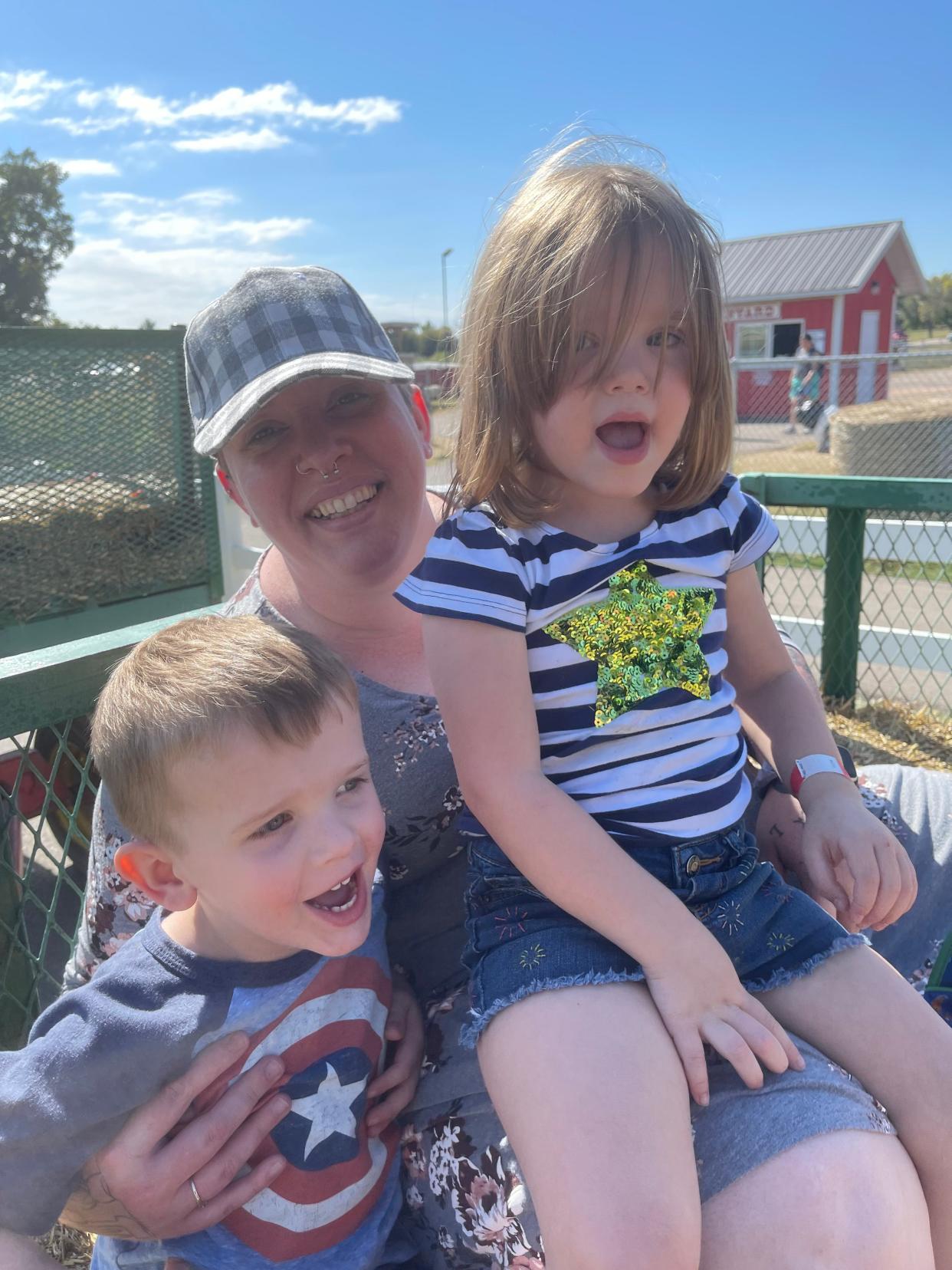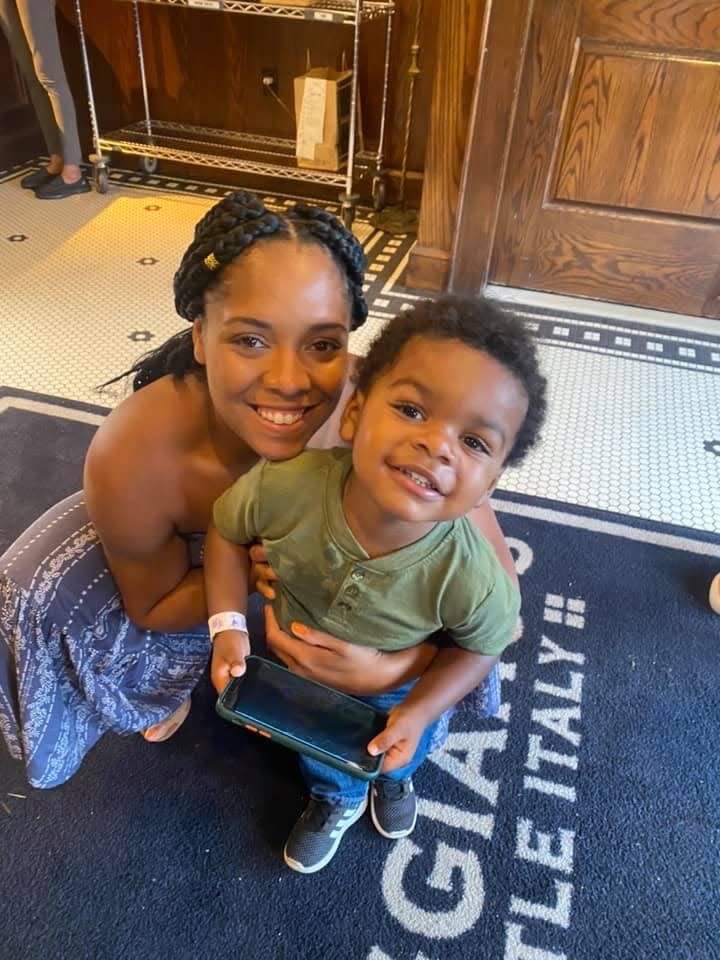What is gentle parenting and why is it making waves?

Gwenna Laithland remembers the exact moment she realized she was a "very reactive parent" and wanted to change. It was when her daughter was 6 years old, and Laithland was struggling to keep her temper in check.
"I would get triggered by my own kid, which honestly happens to a lot of parents. Kids know how to push every button you've got right and it's easy. And at one point, I had lost my temper. I yelled at my daughter and I watched her visibly flinch. And I was like, 'No, I don't like that.' " she recalls. "That's how I started addressing how I was communicating with her, because I didn't ever want to see her flinch because I had hollered at her ever again."
That's when she started incorporating gentle parenting, a style that has gained attention recently on TikTok. The hashtag #gentleparenting has more than 652 million views on the video-sharing app. Google Trends also shows an increase in searches for gentle parenting this year compared to years prior.
Under the username @mommacusses, Laithland, 37, shares stories and tips to her 2 million followers about being a gentle parent to her now 14-year-old daughter and 3-year-old twins.
Stephanie Moss is another gentle parent on TikTok. She began her account @themossmomma_ when her son was about 2. Now, about six months later, she's amassed 356,000 followers that watch as she shows examples of gentle parenting techniques and scenarios.
Moss, 29, grew up in a house that used spanking and yelling as part of parenting, and she knew she wanted things to be different for her son.
"There are things that I just don't want to do in my home," she says. "I am trying to break that cycle personally."

She was also looking for a parenting approach that didn't leave her "just getting through the day," which led her to gentle parenting.
What is gentle parenting?
Gentle parenting looks a bit different for everyone, but Dr. Shawna Newman, Lenox Hill Hospital's director of child and adolescent psychiatry, explains it centers around mutual respect.
"It's the idea of drawing on a sense of collaboration and mutual cooperation in the family. And (it's) not that the kiddo is expected to have the same weight of responsibility (as the parent), it's that they have a voice too and they've learned how to use their voice," she says.
That voice can help them listen and collaborate with others in the future, she says.
"It's so important to have positive interpersonal relationships... and good home life experiences."
Gentle parenting, Newman adds, can be a "conducive way to communicate ideas about having limitations and boundaries that are helpful as opposed to punitive."
Perhaps the opposite of gentle parenting is authoritarian parenting, which places high expectations and focuses on obedience and discipline.
"The challenge with authoritarian is there's almost always a failure. Failure to meet the mark and therefore, punishment follows," Newman explains, adding that strong punishments like spanking have been proven ineffective. "Studies have shown that spanking is neither effective, nor helpful, nor neurologically beneficial. You do not learn an awful lot from spanking except for terror."
@mommacusses Learning consent starts early. No means “Stop and Listen.” #mommacusses #gentleparenting #consentiskey #momlife #realmomlife
♬ original sound - Gwenna Laithland
But gentle parenting isn't permissive parenting, either. Laithland explains she prefers the term "responsive parenting" because with gentle parenting sometimes people assume "you let them do whatever. They can walk all over you."
"That is 100% not true," she says. "I tell them 'no' a lot. I'm very careful to set age appropriate boundaries... Gentle parenting is really more addressing how a parent acts and reacts than it is changing a kid's behavior."
She also says gentle parenting is not about sparing her kids "bad feelings."
"Obviously, as a mom, I don't want them to ever feel bad, but being humans... we're going to have bad feelings," she explains. "So if I can help them navigate those bad feelings when they're little... I'm hoping that as a gentle parent, as a responsive parent, I can facilitate their ability to handle bad feelings."
She practices gentle parenting in a way that prioritizes her kids' emotional development, explaining that in the same way we have to teach children to use a fork, we have to teach them emotional awareness.
"So being able to define what you're feeling and being able to come up with healthy resolutions to the negative things, being able to express yourself so other people understand what you're feeling, being able to communicate why you're feeling that way and being able to read other people's emotional cues."
@themossmomma_ Choices & a little control never hurt anybody 😉 ##GentleParenting
♬ original sound - ToddlerMom & Healthy Parenting
Moss describes it as "a relationship with your child that you're building and growing."
She hopes raising her son this way will benefit him in the future as well.
"I do definitely believe that long term he'll be able to self-regulate his own emotions, he'll be able to problem solve, he'll have strong critical thinking skills, communication skills when he's in school with his peers, and even in relationships with whomever when he's older."
Laithland hopes instilling these values and these boundaries at a young age will give her children the tools to be able to take care of themselves better in the future.
Why is gentle parenting gaining attention?
Newman says every generation of parents struggles to find "the best way" to parent.
"It's so different now than it was 50 years ago, our world and the expectations of what people will be and how they work and how they'll care for themselves. So I think it's gaining traction because it's a very embracing way of conceiving parenthood, and having empathy for both the parent and the child, and that the child needs to be understood, and so does the parent."
As a child of the '80s and '90s, Laithland says she had been "parenting the way I had been parented" until she discovered gentle parenting.
"There were a lot of really good things that my mom did growing up and there were not so great things... There wasn't the world of internet for parents to compare notes," she says. She believes this access to information and newfound mental health awareness plays a role in gentle parenting's popularity.
"This rise in gentle parenting really goes hand in hand with this lifting of the stigma around mental health. We are more aware and more open to talking about things that happened in our childhood can absolutely affect us long term even if it didn't feel big then," she says. "We're getting more comfortable talking about mental health, we're also talking about the mental health of our children, and how we can give them tools to better cope."
@themossmomma_ Unpopular parenting beliefs, but we can still be friends ❤️🥰 ##GentleParenting ##respectfulparenting ##SaveIt4TheEndZone
♬ BUNNY IS QUEEN - Bunny Barbie🐰
Moss agrees that people are "are wanting to learn how they can break (a cycle of) generational trauma that has been passed down, generation to generation."
She also believes the pandemic has played a role.
"COVID kept us at home with our children a lot longer than we thought, and I think people realize, 'I really want to make an impact on my child's life.' Or they felt like they were struggling throughout the day at home with their children for long periods of time, and they want to have a better relationship," she adds.
Though determining the parenting style that works best for you depends on the individual needs of your family, Newman says having "a family culture in which people are mutually heard is a much easier family system to live in."
"If a child feels attended to – it doesn't mean they get everything they want, whenever they want – they know that someone will respond to them," she says. "Not every day you're going to be a perfect parent, but you can always go back to respectful, calmer communication so that there's a less fraught atmosphere in your home."
What is gender creative parenting?: We spoke to parents who let their kids explore gender freely
This article originally appeared on USA TODAY: What is gentle parenting? Why is it making waves on TikTok?

